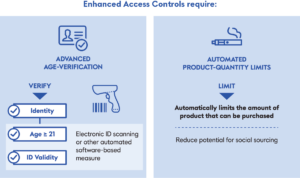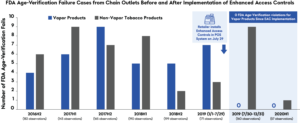STUDY FINDS TECHNOLOGICAL SOLUTIONS DRAMATICALLY IMPROVE RETAILER COMPLIANCE, MAY HELP RESTRICT UNDERAGE ACCESS TO VAPOR PRODUCTS
Research & Analysis
May 21, 2021
As Juul Labs works to reset the category and earn trust, we are committed to working with governments, regulators, and other key stakeholders to advance the harm reduction potential for adult smokers while combating underage use. As part of our reset, we continue to invest our resources in our key priorities, which include developing technologies to combat underage access and use of our products.
Addressing age-verification compliance and social sourcing — when an individual makes a legal purchase and illegally resells to someone underage — remains critical to effectively restrict underage access to tobacco products, including vapor products. Enhanced Access Controls are an objective, proven, and verifiable set of technologically-based standards for retailers to restrict underage access to these products. This is because Enhanced Access Controls address two of the key drivers of underage access: failure to check and verify the purchaser’s ID and bulk purchases of age-restricted product that can be resold or shared with minors.

In early May, Juul Labs researchers published a peer-reviewed paper in the American Journal of Health Behavior assessing the effectiveness of Enhanced Access Controls, using a standards-based technological solution at point-of-sale that automatically prompts electronic ID scanning to verify the age of the purchaser and imposes automated product-quantity limits in order to reduce the potential for social sourcing. After conducting “secret shopper” compliance audits, in which a mystery shopper attempted to purchase JUUL products before and after Enhanced Access Controls were implemented, the study found that compliance failure rates dropped to nearly zero.
As a follow-up to this study, Juul Labs recently published similar work through Qeios analyzing the effectiveness of Enhanced Access Controls using publicly-available data from FDA’s compliance-check inspections of tobacco product retailers. Using this database, the study assessed a regional convenience store chain retailer that implemented Enhanced Access Controls across its outlets. These standards apply for the sale of JUUL products, but have not been widely implemented for other tobacco products.
The study found that, in the period following implementation of Enhanced Access Controls among the chain retailer’s outlets, 217 inspections found no age-verification failures for the attempted purchase of vapor products. Of the 10 age-verification failures during this time period, all involved non-vapor tobacco products (e.g., combustible cigarettes).

In contrast, among retailers without Enhanced Access Controls during the same time period, 28% of age-verification failures resulted from attempted purchases of vapor products. Further analysis showed that the zero incidence of age-verification failures for vapor products in the chain with Enhanced Access Controls was unlikely to have occurred by chance alone, suggesting that it was due to the implementation of Enhanced Access Controls.
The data indicate that automated, technologically-based standards, such as Enhanced Access Controls, can effectively improve retailer compliance to restrict underage access and thus reduce the potential for underage use.
This analysis of FDA’s compliance-check inspections add to the evidence from prior research indicating that Enhanced Access Controls can effectively restrict underage access to tobacco products, including vapor products like JUUL. This type of evidence-based intervention provides an opportunity to fundamentally shift how age-restricted products like vapor products are sold at retail and accelerate the decline in underage use of such products.
Other Posts
October 25, 2024
ROBYN GOUGELET DELIVERS REMARKS DURING A PUBLIC MEETING HOSTED BY FDA AND NIH
On October 21, Juul Labs’ Vice President of U.S. Regulatory Affairs, Robyn Gougelet, delivered remarks during a joint public meeting hosted by the U.S….
March 17, 2023
JUUL LABS PUBLISHES WHITE PAPER EXAMINING THE REAL-WORLD IMPACT OF ENDS PRODUCTS FOR ADULT SMOKERS
In a new white paper entitled “The Real-World Impact of ENDS for Adult Smokers: Tobacco Harm Reduction Through Real-World Data and Evidence,” Juul Labs has reviewed and compiled the latest science and evidence demonstrating the positive real-world impact of ENDS products for adult smokers.
March 17, 2022
PEER-REVIEWED STUDY FINDS BANNING VAPOR PRODUCTS MAY LEAD TO INCREASED CIGARETTE SALES
This research shows that policies that significantly restrict vapor products are likely deterring current adult smokers from switching and driving former adult smokers back to combustible cigarettes, which remain the leading cause of preventable death in the U.S. and worldwide.
